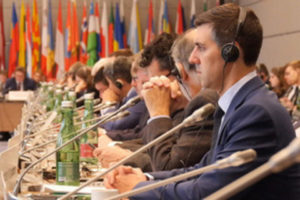15th March 2021
The Important Role of the OSCE in Strengthening European Security

For audiences outside of Vienna (where its headquarters are based), the Organization for Security and Cooperation in Europe (OSCE) would benefit from demystification, and this is why I have decided to start this blog. It is an important international organisation and is here to make all of us living in its 57 participating States collectively safer. Its comprehensive approach to security – incorporating conflict resolution and dispute management, conventional arms control, transnational threats, economic and environmental security related issues, and respect for human rights and fundamental freedoms – is a strength. But because it is so comprehensive, it can make telling the story – on what the OSCE is, what it does, and why it makes us safer – tricky.
So what is the OSCE? In a nutshell, it is the world’s largest regional security organisation, spanning from Canada and the US on its western edge to Russia (and Mongolia) on its eastern, and all the way from the Arctic Circle down to the Mediterranean, Turkey, the Caucasus and Central Asia. At the heart of the OSCE is a set of core principles and commitments all countries have freely signed up to – starting from the Helsinki Final Act. These include: non-use of force, respect for sovereignty, territorial integrity, and protection of human rights and fundamental freedoms – that are used to hold states to account, and a series of fora, agreements, institutions and instruments designed to uphold these commitments. This includes 16 field missions.

One area where OSCE work has been vitally important is in supporting the international community’s response to Russia’s aggression against Ukraine. In 2014, Russia illegally annexed Crimea and initiated and fuelled conflict in eastern Ukraine to further destabilise the country – in violation of its above OSCE commitments. For European (and global) security, Ukraine’s sovereignty and territorial integrity within its internationally recognised borders must be respected. The OSCE runs a complex civilian monitoring mission – the Special Monitoring Mission (SMM) – which provides impartial, evidence-based reporting, particularly focused on the conflict area in Ukraine. This is the OSCE’s largest mission and is comprised of hundreds of international monitors, of which the UK is a large contributor. I met first-hand with the UK SMM contingent on the important work they are undertaking on the ground.
The OSCE also chairs the Trilateral Contact Group – a conflict resolution and mediation mechanism to advance efforts towards finding a peaceful and sustainable resolution to the conflict in eastern Ukraine. The Trilateral Contact Group – together with the Normandy Four – are structures we support in working towards this goal. Where there has been political will, confidence building measures – to mitigate the impact of the conflict on civilians – have been agreed. For example, OSCE involvement was vital in securing the rebuilding of a critical bridge used by civilians to cross the contact line in Luhansk region in 2019.
The OSCE also has a set of conflict resolution and mediation mechanisms and structures in the conflicts in Georgia (the Geneva International Discussions), Moldova (the 5+2 process), as well as the Minsk Group and Minsk Group Co-Chairs. All these formats play a role in bringing relevant parties together to discuss key conflict resolution issues.
There are some tangible examples of OSCE support to civilians in these conflict zones. In Moldova, the OSCE Mission has provided the international community with an understanding of access restrictions on civilians’ freedom of movement by the de facto authorities in the Transnistrian region. In Georgia, engagement by the OSCE has been able to help resolve some sensitive detention cases, and OSCE projects have had a role in restoring access to potable water and rehabilitating a kindergarten in villages near the Administrative Boundary Line.
The OSCE is the key location for conventional arms control in Europe (including the Vienna Document and the Open Skies Treaty). It is important to ensure the focus on effective and verifiable arms control is preserved. This includes through modernisation of the Vienna Document, which 45 OSCE participating States agreed was needed in December 2020. The OSCE offers an important forum to understand security threats for different countries and work together to mitigate them, including on the growing threat from hybrid attacks.

52 OSCE states also committed last year to improve UNSCR 1325 implementation in the OSCE, through increased, concrete actions to promote and advance the Women, Peace and Security agenda at the OSCE. An important area to progress. Women’s participation is key to the success and longevity of peace processes and vital to ensure the OSCE provides comprehensive security for all.
The OSCE has a set of commitments and measures to assist with reducing transnational security threats, such as cyber, terrorism and serious organised crime. This includes 16 cyber confidence-building measures. I am in my second year of chairing the Security Committee, which focuses on transnational threats and measures to overcome them. Last year, the first OSCE Ministerial Council decision since 2006 on tackling serious organised crime across the OSCE area was adopted. This provides an opportunity to work this year on implementation through the OSCE structures, including on prevention. In addition, the OSCE can play a leadership role on cyber capacity building, and security would be further enhanced by continuing to action the cyber confidence building measures. The UK and Canada hosted a practical table-top exercise in this area in 2019.

On economic and environmental security related issues – including anti-corruption, energy security, and digitalisation– the OSCE has a series of commitments and provides an opportunity to share best practice. Women’s economic empowerment is an area of focus for 2021 for the Swedish OSCE Chairpersonship.
The OSCE has a set of principles and commitments on human rights, rule of law and democratic governance, and a set of tailored institutions (including the Office for Democratic Institutions and Human Rights – ODIHR; the Representative on Freedom of the Media – RFOM; and the High Commissioner on National Minorities – HCNM). Through ODIHR, the OSCE deploys missions to observe elections in order to strengthen the democratic electoral processes, supports judicial and legislative reforms to ensure that justice systems operate free from undue influence, and works to advance tolerance and non-discrimination across the OSCE. This is vital work. The RFOM both places a spotlight and works alongside countries on individual area of concern on freedom of the media and safety of journalists. The OSCE also offers a platform to remind countries of their human rights commitments and to draw attention to incidents of abuse, including on areas such as freedom of peaceful assembly, arbitrary arrest and detention, and use of torture, cruel, inhuman or degrading treatment. Through its institutions, the OSCE could play an essential role on enhancing resilience to disinformation.
The OSCE is a consensus based organisation, which makes it highly susceptible to politicisation. It is important to remind ourselves of our commitments in all the above areas of security – this is not an a la carte approach; respect for all of our commitments makes us safer and more secure. This benefits all the citizens in our respective countries. There was a good reason why all countries came together in Helsinki to work on a set of principles and commitments to uphold collectively. We need to rekindle that spirit.